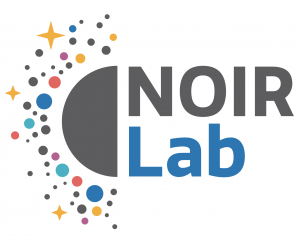Podcaster: Rob Sparks. Guest: Rachel

Title: NOIRLab – : AEON (Astronomical Event Observatories Network)
Organization: NOIRLab
Links: https://www.facebook.com/NOIRLabAstro ; https://www.instagram.com/noirlabastro/ ; https://www.youtube.com/noirlabastro ; @NOIRLabAstro
Link to the news:
- AEON: Tracking Things That Go Bump In The Night: https://noirlab.edu/public/bl
- LCO’s AEON website: https://lco.global/aeon/
- NOIRLab’s website: https://noirlab.edu/public/projects/aeon/
- SOAR’s website: http://www.ctio.noirlab.edu/soar/content/soar-aeon-home-page
Description:
AEON (the Astronomical Event Observatory Network) will be a collection of world-class telescope facilities which can be accessed on demand, at the touch of a button. At the heart of the network, LCO is joining forces with the NOIRLab CSDC and the SOAR 4.1m and Gemini 8m telescopes to build a network for the LSST era.
Bio: Rob Sparks is in the Communications, Education and Engagement group at NSF’s NOIRLab.
Rachel joined Las Cumbres Observatory (LCO) as a post-doctoral scholar in 2007, and has since become a Staff Scientist. She specializes in the detection and characterization of exoplanets, initially as a founder member of the SuperWASP transit survey, for which she received the RAS Group Achievement Award. Since joining LCO, she began to study exoplanets via the transient phenomena of microlensing, and now leads the microlensing group there. In the course of this research, she developed automated Target and Observation Management software (TOMs) to make observations through the LCO Network. This motivated her to lead the TOM Toolkit project and to contribute to the development of the Astronomical Event Observatories Network (AEON), to make these powerful observing tools available to the community as part of the ecosystem of software needed to respond to modern survey discoveries.
Rachel was elected as co-chair of the Transients and Variable Stars Science Collaboration (one of the Rubin Observatory’s Science Collaborations) in 2017.
End of podcast:
365 Days of Astronomy
=====================
The 365 Days of Astronomy Podcast is produced by Planetary Science Institute. Audio post-production by Richard Drumm. Bandwidth donated by libsyn.com and wizzard media. You may reproduce and distribute this audio for non-commercial purposes.
This show is made possible thanks to the generous donations of people like you! Please consider supporting to our show on Patreon.com/365DaysofAstronomy and get access to bonus content.
After 10 years, the 365 Days of Astronomy podcast is poised to enter its second decade of sharing important milestone in space exploration and astronomy discoveries. Join us and share your story. Until tomorrow! Goodbye!Toggle panel: Podcast Episode

